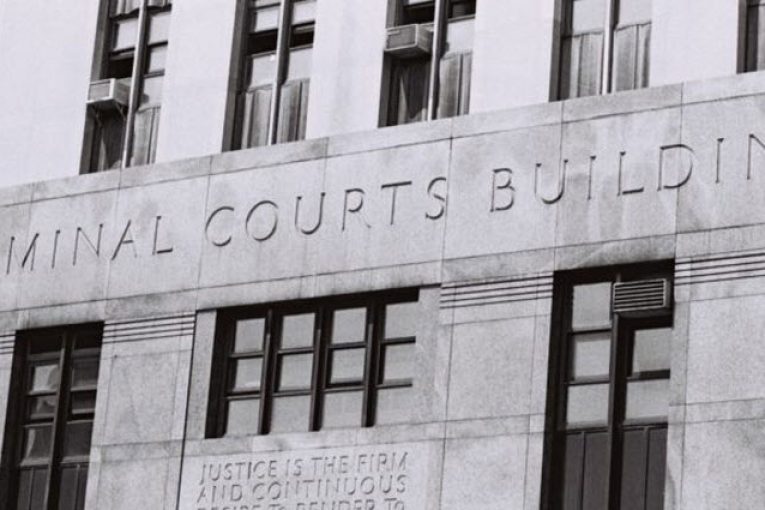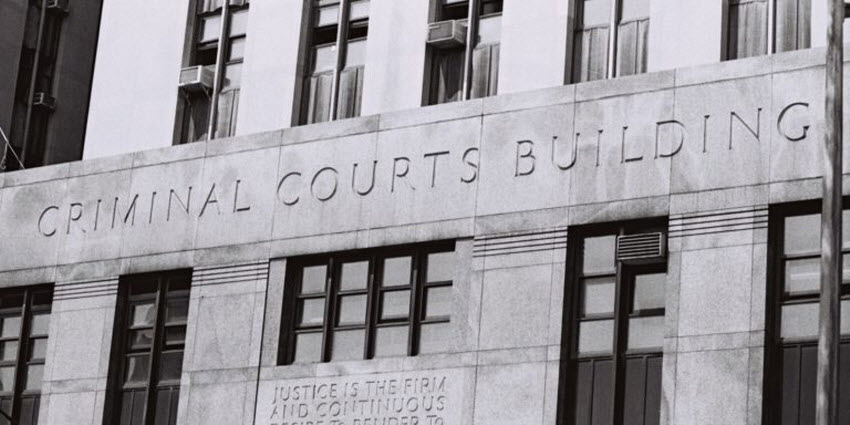

by Rory Fleming
Since the brutal murder of George Floyd by Minneapolis cops, activists across the country have passionately called to defund the police. Few similar calls have been made about prosecutors’ offices.
But America’s prosecutors are complicit and should be defunded, too. Because police are only one part of a system that devalues and extinguishes Black lives.
Prosecutors typically spend most of their time sending people to county jails for the pettiest of offenses, where they often suffer awful conditions and sadistic guards. Prosecutors also decide whether or not cops in their jurisdiction ever face deterrents to killing unarmed Black people in broad daylight. The vast majority never charge the police, meaning killer cops in some cases made a risk-based decision—and these off-the-cuff determinations are frequently racist.
Despite all of this, prosecutors are rarely penalized through their budgets—unless a local scandal in the district attorney’s office happens to get tons of attention. And despite a growing recognition from academics, advocates and criminal justice practitioners that the only way to shrink the carceral state is to give its actors less power, that is almost never applied as a reason to decrease a DA’s budget.
Decreasing DA budgets would force top local prosecutors to make the hard decisions they currently, thanks to inflated budgets, don’t have to. They would need to consolidate or shrink certain units, logically starting with the ones that respond to low-impact “crimes” that do not create physical or mental trauma. Narcotics and other drug units would be prime candidates for cuts, as well as misdemeanor units. These units are currently feeder positions to higher ranks in the office, so it’s how young prosecutors often learn to do the job.
As one anonymous senior prosecutor from the Southeast explained to authors of a recent study for the Arizona Law Review:
“When you first start on the Misdemeanor Team, those DWIs are serious stuff. And then you move on to the Drug Team, and all of a sudden, the DWIs don’t seem so serious anymore. And all of a sudden, a  couple of ounces of weed seems like the biggest crime on the planet. Then you do Drug Team for a while, and you realize that there’s kilos of cocaine out there, and weed doesn’t seem like a big deal anymore. And then you do the Persons Team, and you see people actually getting robbed at gunpoint. Then drugs don’t seem like a big deal anymore. So as you kind of go up the ladder, everything gets put in perspective…”
couple of ounces of weed seems like the biggest crime on the planet. Then you do Drug Team for a while, and you realize that there’s kilos of cocaine out there, and weed doesn’t seem like a big deal anymore. And then you do the Persons Team, and you see people actually getting robbed at gunpoint. Then drugs don’t seem like a big deal anymore. So as you kind of go up the ladder, everything gets put in perspective…”
Instead of young prosecutors zealously cutting their teeth on drug possession and petty theft cases, they might spend more time on domestic violence cases, which are more psycho-socially complex than legally complex, and arguably under-prosecuted. (They are usually misdemeanors.) A DV focus could be strong preparation for major crimes units, as domestic violence-related murders are frequent and on the rise.
Inevitable Resistance
Despite a rapidly changing situation—for example, the Minneapolis City Council just voted to dismantle its police department, and the COVID-19 pandemic could ride a second wave—prosecutors are still thinking of little else but saving their own budgets. Even the best, most “progressive” ones.
Philadelphia is currently shaping its budget for the next calendar year. Mayor Jim Kenney, an ostensible progressive, demanded $14 million more for the Philly Police Department. The City Council said no, opening its letter to the mayor with the words, “Philadelphia can’t breathe,” then explaining that “we too often ask the police to solve problems better addressed by social workers, health care providers, educators, housing counselors, and others.”
In addition, the council wants to cut Philadelphia DA Larry Krasner’s budget. Now Krasner is standing in the way, claiming “the city could wipe out the progress it’s made in decreasing the prison population, as defendants spend months in jail awaiting trial.”
Since taking office in 2018, Krasner has been increasing the size of his office, albeit in large part to beef up the Diversion Unit. Loking at the budget document from last year suggests that Krasner is leveraging his diversion programs to force the Council to give him the budget he wants, despite COVID-19 decreasing most crimes’ occurrence. One has to also wonder if Krasner is planning to not drop charges filed against Black Lives Matter protesters—even though he spent years as the movement’s defense lawyer.
Encouragingly, there is precedent for councils refusing to cave to prosecutorial threats in this area. In 2017, Dane County (Madison), Wisconsin District Attorney Ismael Ozanne was publicly enraged about the fact that his budget had not kept up with inflation for decades. He threatened to stop prosecuting lower-level cases unless the county commission gave him money for a dozen new prosecutors. The council scoffed at the demand.
Similarly, the Philadelphia City Council has good reasons to hold its course. There are numerous low-level, nonviolent drug-law violations for which Krasner still forces people to go through humiliating, punitive diversion courts. This is especially glaring in drug possession cases.
Krasner was once praised for saying he would no longer prosecute marijuana possession. Only a year later, in a sign of how fast things were moving, Boston elected DA Rachael Rollins, a progressive Black woman, on a platform of drug possession decriminalization in line with Portugal’s. Likewise, Krasner has the authority, via prosecutorial discretion, to quietly start dropping all (or, at least, virtually all) nonviolent, low-level drug cases. That would push the burden to the city’s public health department to try to reduce problematic drug use through non-coercive, non-carceral means.
In fact, that’s what Krasner already said he would do, both on the campaign trail and in a 2019 statement. When’s it going to happen?
If Krasner can’t figure this out himself, there’s no better time for the council to slash his budget as planned. If he then needs to furlough some early-career prosecutors, fine. Public defenders’ offices across the country have had to do it, and there’s still no pay parity between defenders and prosecutors in Philly. There’s a backlog of new cases since the Philly police resumed standard arrest protocols in May? Drop the cases.
Other prosecutors around the country—most of whom are far, far worse than Krasner—should similarly be the target of calls for budget cuts that would reduce the damage they do. This is a policy that would meet two urgent needs of these extraordinary times: helping jurisdictions to survive financially amid the coronavirus upheaval, and taking concrete forward steps in the movement for Black lives.
This article was originally published by Filter, a magazine covering drug use, drug policy and human rights. Follow Filter on Facebook or T
To sign up for our new newsletter – Everyday Injustice – https://tinyurl.com/yyultcf9

Um . . .